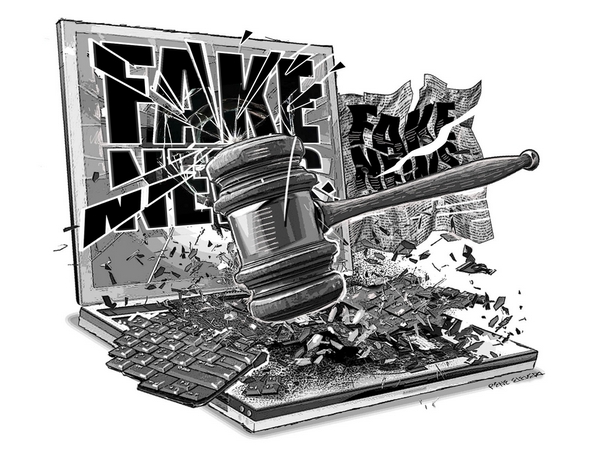
SIFTING THROUGH THE LIES
PART 2
Except for an outdated law on false information, the Philippines has no existing regulations that present clear-cut policies against the proliferation of bogus news.
“The spread of fake news is very disturbing. People are deceived and reputations have been shattered,” said lawyer Jose Glenn Capanas, president of the Integrated Bar of the Philippines’ Cebu City Chapter.
According to Capanas, before the problem gets out of hand, it is high time for government to take the lead in fighting fake news.
“I find it appropriate and urgent for the government to be aggressive against fake news,” Capanas said in an interview.
The first step, he said, is to enact new laws to keep pace with technology.
At present, paragraph 1, Article 154 of the Revised Penal Code provides sanctions for “any person who by means of printing, lithography, or any other means of publication shall publish or cause to be published as news any false information which may endanger the public order, or cause damage to the interest or credit of the state.”
The penalties are imprisonment from one to six months and a fine ranging from P200 to P1,000.
While there were persons charged for violating this law, not even one was convicted of the offense since it was enacted in 1930.
“The Revised Penal Code was crafted years before the emergence of social media. Our concern now is, at present, there’s even no law defining fake news,” Capanas said.
Stop online assaults
Government leaders in Cebu, who claimed to have fallen victim to fake news, misinformation, and propaganda on social media, have joined calls to stop online assaults.
“There’s plenty of fake news going around — really a number of them. People have to be informed about these scams,” said Cebu City Mayor Tomas Osmeña.
Cebu Gov. Hilario Davide III, for his part, noted that it has become more difficult to decipher whether the information being circulated was true or false.
“Fake news is all over the place. I, myself, could hardly determine whether this particular story is worthy of belief. That is why we need to be on guard,” he said in an interview.
“I just don’t understand why there are people who can afford to ruin the reputation of others by spreading lies,” he added.
Vice Gov. Agnes Magpale said the damage caused by fake news is irreparable. “You just cannot undo the damage. Good if it was only an error in the story. But to deliberately fabricate a scenario, that is unfair,” she said.
Senate bills
Senators Joel Villanueva and Grace Poe have crafted separate bills to stop the spread of fake news in the country.
In July 2017, Villanueva proposed fines of P100,000 to P5 million, and an imprisonment ranging from one to five years for any person found guilty of maliciously offering or causing the publication, distribution, circulation, or spreading false news.”
Such false news, Villanueva’s Senate Bill 1492 bill states, must cause or tend to cause panic, division, chaos, violence, hate, or must exhibit or tend to exhibit a propaganda to blacken or discredit one’s reputation.
Villanueva said the person must have full knowledge that such news or information is false or have reasonable grounds to believe that the same is false.
In addition, he proposed to penalize any mass media entity or social media platform that “fails, neglects, or refuses to remove false news or information within a reasonable period after having knowledge or its falsity.”
Violators will be punished with a fine ranging from P10 million to P20 million, and an imprisonment ranging from 10 to 20 years.
In the bill’s explanatory note, Villanueva said the effect of fake news should not be taken lightly.
“Fake news creates impression and beliefs based on false premises leading to division, misunderstanding and further exacerbating otherwise tenuous relations,” he said.
Senate Bill 1492, he said, will encourage citizens, especially public officers, to be more responsible and circumspect in creating, distributing, or sharing news.
“Addressing national and global concerns should not be made more complicated by false news calculated to cause disunity, panic, chaos, and/or violence,” Villanueva said.
Meanwhile, Senator Poe proposed to penalize those in government who publish or disseminate false news or information in any platform.
Her Senate Bill 1680 seeks to amend Republic Act 6713 or the Code of Conduct and Ethical Standards for Public Officials and Employees.
As government official or employee, Poe said any information they share “bears the seal of being official” and thus carries with it the presumption of truthfulness, reliability, and accuracy.
“It is thereby the goal of this legislative measure to hold public officials to higher standards in the advent of the unavoidable continuous rise of the influence and Internet penetration brought about by social media,” said Poe, head of the Senate committee on public information and mass media.
Unconstitutional
Malacañang, however, stressed that any law penalizing fake news on social media would be unconstitutional as this would curtail freedom of speech.
President Rodrigo Duterte did not only refuse to condemn the spread of fake news and the aggressiveness of his online supporters, but he also rewarded some of them.
Model and blogger Esther Margaux “Mocha” Uson, for one, was appointed Assistant Secretary of the Presidential Communications Operations Office (PCOO) even as she continues to maintain her famous pro-Duterte blog that gained prominence for multiple falsehoods and photos.
In a Senate hearing on fake news in Oct. 2017, Uson reasoned that she merely shared posts from other websites.
She also explained that she was a blogger, not a journalist, and therefore exempted from the rules on fairness and transparency, she said.
But last April 2, youth and student leaders from Akbayan filed an administrative complaint against Uson before the Office of the Ombudsman for allegedly using her position to proliferate “fake news” and silence critics of the government.
The complainants sought for Uson’s “removal from office and dismissal from service” for grave misconduct, serious dishonesty, and conduct prejudicial to the best interest of public service.
Another blogger Rey Joseph Nieto, who runs the blog site “Thinking Pinoy,” was also accused of disseminating disrespectful content and falsehood online.
Initially hired as a social media consultant of the Department of Foreign Affairs, Nieto eventually backed out of his
contract.
Grilled by senators regarding responsibility and fairness in a hearing on fake news last year, Nieto defended his right to publish posts critical of opposition senators on his blog.
“It is not a crime to hurt feelings,” said Nieto during the Senate hearing.
(To be continued)
What ‘fake news’ is. What it is not.
(Cebu Citizens-Press Council definition)
“Fake news” or “false news” is fabricated content presented as factual information in the guise of news.
* * *
Mistakes in reporting and editing, made in good faith in the rush of deadline, are not “fake news” or “false news.” Still such errors violate journalism standards and shall be avoided or promptly corrected.
Careful reporting and editing help prevent publication of “fake news” or “false news.” Diligent fact-checking hastens exposure of misinformation and falsehood in content.
* * *
Published content violates journalism standards if:
It is materially or substantially contrary to facts;
It is published with knowledge that it is false or with reckless disregard of the facts; and/or
It is deceptive, as its real nature or origin of publication is concealed or disguised; or it is malicious, as it misleads for personal profit or partisan ends, or tends to inflict harm, sow hate, or devalue norms of traditional media.
* * *
Content shall include not only text or words but also photographs, video clips, graphics and other material presented as news or information.
Disclaimer: The comments uploaded on this site do not necessarily represent or reflect the views of management and owner of Cebudailynews. We reserve the right to exclude comments that we deem to be inconsistent with our editorial standards.

